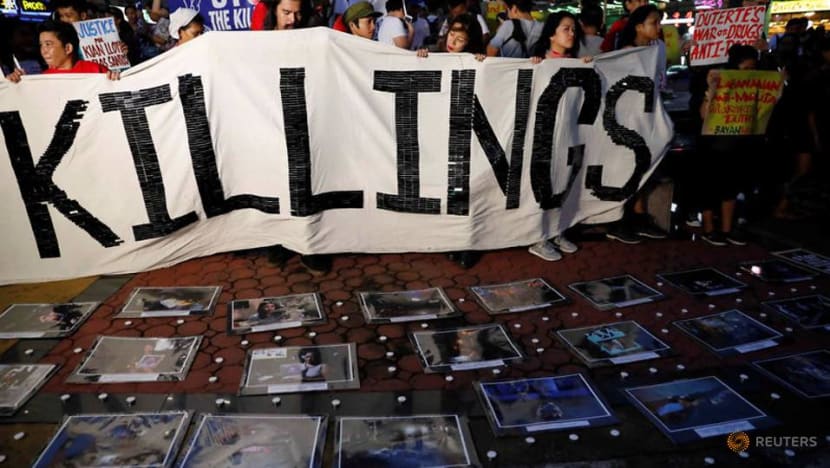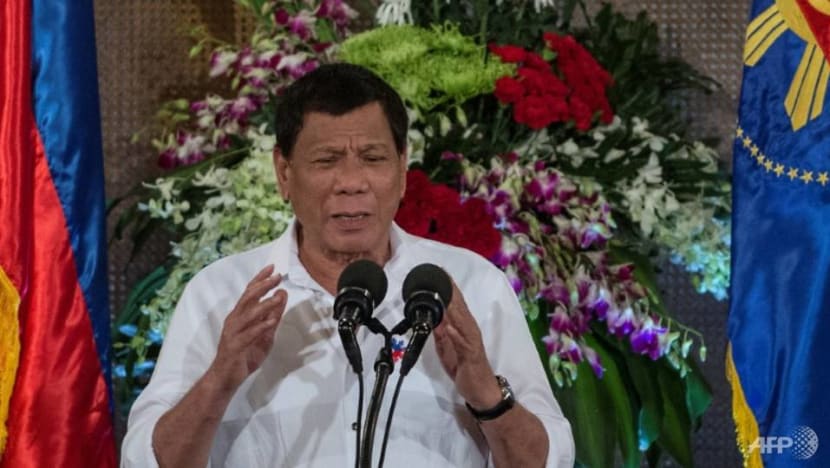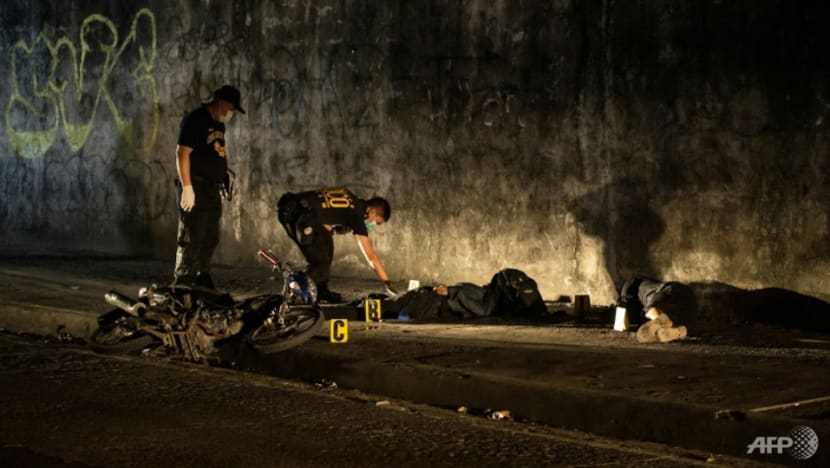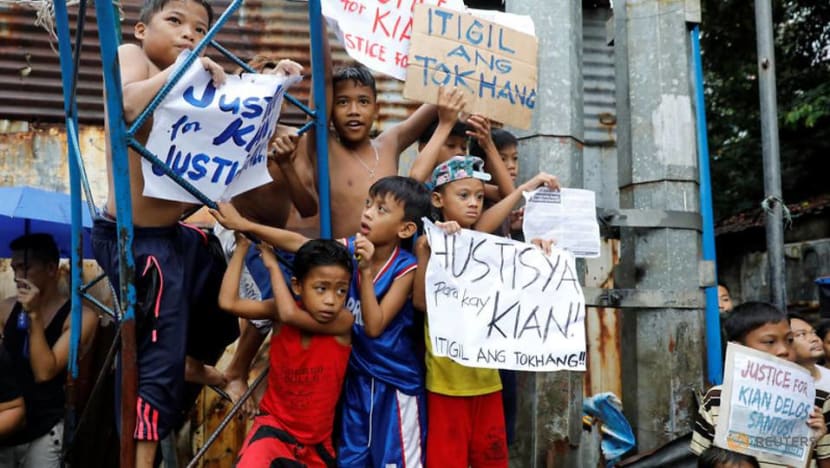commentary Asia
Commentary: The good, the bad and the ugly of Rodrigo Duterte’s war on drugs
Philippines President Rodrigo Duterte’s approach is casting aspersions on law enforcement and the Philippine justice system, says political commentator Gideon Lasco.

Activists take part in a rally after 91 people were shot dead in a week in an escalation of President Rodrigo Duterte's ruthless war on drugs in Quezon city, Metro Manila, Philippines, Aug 18, 2017. (Photo: REUTERS/Dondi Tawatao)
MANILA: From the moment he took office on Jul 1, 2016, Philippine President Rodrigo Duterte has made the war on drugs his top priority.
“We will not stop until the last drug lord, the last financier and the last pusher have surrendered or are put, either behind bars or below the ground, if they so wish,” he declared in his first state of the nation address.
The Philippine war on drugs, however, has been marked by controversy and criticism from human rights groups, foreign governments and the United Nations.
Having called the war on drugs a policy with heavy-handed tactics that are “dangerously out of step” a few weeks ago, UN Office of the High Commissioner for Human Rights special rapporteur Agnes Callamard called for a probe into the Philippines war on drugs.
Such scathing comments beg the question of what Duterte’s war on drugs have achieved over the past year that justifies its continuation.
THE GOOD – HIGHLIGHTING THE DRUG PROBLEM
The first legacy of the war on drugs has been to shine a national spotlight on the Philippines’ drug problem.
To Duterte’s credit, his government has not shied away from inconvenient truths like the fact that the Philippines is becoming a trans-shipment point for the global drug trade, and the high number of 1.8 million drug users in the Philippines.
Duterte has also courageously and rightfully identified the involvement of politicians in the drug trade. Long before his arrival in the national scene, government officials have been implicated in participating or protecting the drug trade, but previous presidents have turned a blind eye.
Duterte’s attention on drugs has also challenged health officials to offer rehabilitation services and even consider targeted and sustained community-based interventions. In 2016, Philippine Health Secretary Paulyn Ubial declared drug use a “public health concern”.

Though these efforts have not born significant fruit, they at least hint at openness on the part of Philippine government agencies to approach drugs in a comprehensive and open way.
A recognition of the severity of the situation in turn, is going some way in progressing the Philippine government's response to an undeniably major problem for the Philippines. Police officers have gone around communities in the Philippines with high levels of drug users and traffickers, and millions have signed up for drug rehabilitation programmes.
THE BAD – A DANGEROUS PHILOSOPHY
However, the way the Philippine government has communicated the drug problem to the public perpetuates various misconceptions that undermine efforts to solve the drug problem in an effective and sustainable way.
Duterte, for instance, repeatedly conflates all kinds of drug users - pushers, dependents, occasional users - lumping all of them together as perpetrators of violence, despite evidence that just a small fraction of drug use is problematic.
He has also made no secret of wanting to see suspects killed rather than jailed, sometimes with very little supporting evidence of their involvement in the drug trade.
Allegations of planted evidence are rife so it is not surprising that there is growing concern that the war on drugs may be used as a political tool.
Relying only on the testimony of convicted drug lords, Senator Leila de Lima - a longtime critic of Duterte’s iron-fisted policies even when he was a mayor - remains detained on charges of drug trafficking. Recently, and without providing evidence, Duterte has publicly called Iloilo Mayor Jed Patrick Mabilog a drug personality and issued him a thinly-veiled death threat.

Aside from revealing a gangster leadership style rarely seen in past Philippine presidents, all these trends suggest that Duterte’s government may be using the war on drugs and the Philippine political system to deal with dissent against his administration and silence critics.
Such allegations have not only undermined his war on drugs but also cast aspersions on the Philippines’ justice system.
THE UGLY – EXTRAJUDICIAL KILLINGS
Duterte has also taken an iron-fist approach to stamping out drug cartels, by aggressively deploying state forces in anti-drug operations around the country.
While the Philippine National Police reports over 3,000 killed in legitimate police operations, human rights groups claim the number is much larger, given that the police also report several thousands “deaths under investigation”.
There are some high-profile individuals involved, but most of the victims have come from poor neighbourhoods. One of them, 17-year-old Kian delos Santos, elicited outrage recently as CCTV footage of him being dragged by two men emerged - contrary to the police’s account that the victim fought them.
Some would justify the war on drugs as a choice between saving drug users and saving victims of heinous crimes like rape and murder.
However, these statements already presume the guilt of all victims of the war on drugs – an unlikely scenario in light of cases like Kian’s and other minors, numbering over 50, that have been killed in the course of the drug war.
They also paint a false scenario in which Filipinos have to make a choice, when the police can and should be protecting all victims from crime and apprehending criminals to be trialed by the justice system.

Others would insulate Duterte from responsibility and blame the killings on the vigilantes - and a few corrupt policemen.
But even if we are to ignore reports of policemen staging crime scenes and being paid to kill drug suspects, Duterte’s rhetoric - which includes vowing to protect police from prosecution, and even suggesting that they plant guns if suspects have none - have doubtless enabled a culture of impunity and violence that is undermining the rule of law in the Philippines, and damaging the credibility of institutions, including the police itself.
DUTERTE CONTINUES TO ENJOY POPULAR SUPPORT
While Filipinos are increasingly concerns about the extrajudicial killings of drug suspects and are becoming fearful for their own safety, surveys show that Duterte continues to enjoy popular support. These dissonant figures belie the simplistic idea that Filipinos are uncritically supportive of the war on drugs.
Despite the intensely polarised debates, however, there is actually common ground and strong agreement within the Philippines that the drug problem needs to be addressed.
This common ground needs to be highlighted to counter the binary choices presented to people that they are either for the war on drugs or for the drug trade.
The Duterte government should also consider ramping up softer best practices that have been effective - such as Bogo City achieving "drug-free" status with zero deaths through multi-sectoral cooperation and community-based rehabilitation.
When these success stories are held against the gruesome human toll of the Philippine government's current paradigm, perhaps Filipinos will finally be convinced that instead of the failed and deadly "war on drugs", we should move towards a comprehensive, humane, evidence-based approach: One that addresses the reasons why people are using drugs in the first place.
Dr Gideon Lasco is a political commentator who writes a weekly column for the Philippine Daily Inquirer.














